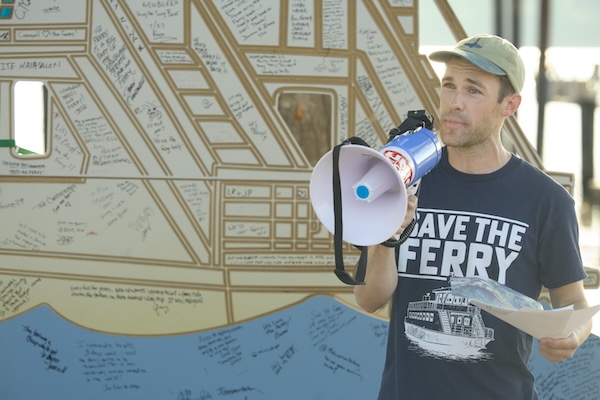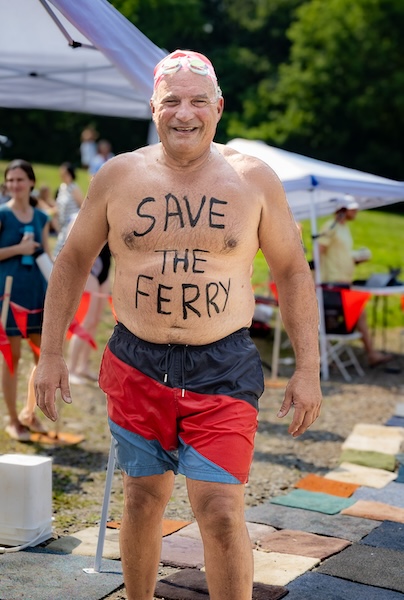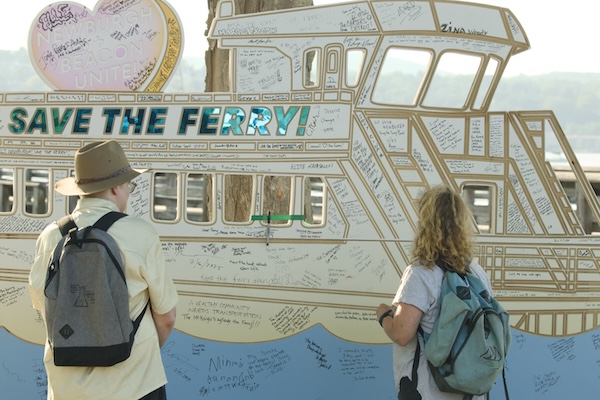Assembly member says he’ll find money for dock
State Assembly Member Jonathan Jacobson pledged on Tuesday (July 29) to find funding for the City of Beacon to construct a new ferry dock, the first step, he said, to restoring service between the city and Newburgh.
Jacobson, a Democrat whose district includes Beacon, was among more than 100 residents and elected officials who braved sweltering heat to rally at the Beacon waterfront in support of the ferry that had connected the two cities for years before being discontinued by the Metropolitan Transportation Authority. Chanting “Gov. Hochul, MTA / Bring our ferry back today!” and “Keep us afloat / Fund the boat!”, the crowd was joined by a flotilla of kayakers in the Hudson River.

The MTA announced in June that commuter ferry service would not return after damage to the agency’s floating dock at the Beacon waterfront led the MTA to re-examine its cost amid dwindling usage. NY Waterway had operated the ferry for the MTA since 2005, but ridership, which peaked at an average of 227 people daily in 2008, had slowed even before the pandemic. By 2024, it was carrying 62 people per day.
On Tuesday, advocates said they want the MTA to restore service for commuters and to provide daily service for tourists visiting Newburgh and Beacon.
Jacobson said the $2.1 million the MTA paid annually to NY Waterway to operate the ferry was miniscule compared to the agency’s nearly $20 billion budget. “That’s one penny out of $100,” he said. “Give us our penny and save the ferry.”

The Assembly member said he would work to find funding. Earlier this month, he secured $250,000 for the Beacon Volunteer Ambulance Corps and in May obtained $150,000 for Beacon’s South Avenue Park rehabilitation project.
However, Metro-North President Justin Vonashek said in a statement this week that the expense of operating a ferry for relatively few commuters “didn’t add up.” The good news, he said, is that the MTA launched a Newburgh-to-Beacon bus after ferry service was suspended in January. It “provides more connections to Beacon trains throughout the day than the ferry did,” he said.
The bus costs $1.75 each way, the same as the ferry, but Metro-North has said it will become free in 2026.
The most popular route for the Beacon Bicycle Coalition’s monthly group rides has been to cross the Newburgh-Beacon Bridge, stop for food and drinks on the Newburgh waterfront and take the ferry back to Beacon, said Yvonne Caruthers, who spoke at the Tuesday rally and is one of the coalition’s founders. “Everybody’s jaw drops” when they see the landscape from the water, she said. Equally as important as the economics, she said, is “how you feel about where you live.”

State Sen. Rob Rolison, a Republican whose district includes Beacon and Philipstown, said that the ferry’s fate rests with Gov. Kathy Hochul. The MTA Board members, he said, “take their direction from her.” Calling the issue nonpartisan, he said the ferry is “smart and it’s good for the environment. We’re going to get there, I promise you.”
The MTA Board met on Wednesday, and a handful of advocates made public statements, including Oliver Meyer, 15, a Beacon resident who said he used the ferry to get to and from the ice cream shop on the Newburgh waterfront where he works.
“This is my first job, and the ferry played a huge part in my parents allowing me to work at 14,” he said. If the ferry was stopped because “it’s not making money, then expand the hours. Newburgh has a thriving waterfront, food and tourism scene, but it could be a million times better if you could take the ferry to and from it.”
Rep. Pat Ryan, a Democrat whose district includes Beacon, wrote to Janno Lieber, the CEO of the Metropolitan Transportation Authority, that “permanently discontinuing the ferry will disrupt our constituents’ commutes, harm our community’s economic development and rip away a special Hudson Valley feature that connects our community in a way that no other transportation mode can.”


With the development of the train station lots and the ongoing development of the Newburgh waterfront, linking that development to revitalizing the ferry should be incorporated. A free bus is not worth it if it’s stuck in traffic. On some days, the traffic on North Avenue (Route 9D) extends from Interstate 84 to Verplanck Avenue. Add to that the backup getting out of the station on Beekman and it will be a long, slow commute. The ferry would be quick and a way to encourage business on both sides of the river.